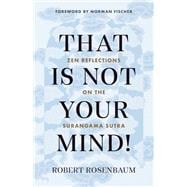Viewed through the lens of psychology and neuroscience, a classic Zen sutra becomes a springboard for exploring sensory experiences and realizing freedom.
What does it mean to be liberated through one’s sensory life? In That Is Not Your Mind! Zen teacher Robert Rosenbaum explores this question by taking readers on a step-by-step journey through the Surangama Sutra. This Chinese Mahayana sutra is known for its emphasis on practicing with the senses (sight, sound, taste, smell, touch, and the Buddhist “sixth sense” of mind or cognition), as well as its teachings on the necessity of basic ethical commitments, like not killing or stealing, to support the development of one’s meditation practice and insight.
Rosenbaum interweaves passages from the sutra with contemporary insights from neuroscience and psychology, illustrating the usefulness of the text with anecdotes from his life and his forty years of teaching experience. In addition to learning about a sutra that played an important role in the creation of Chinese Chan and Japanese Zen Buddhism, readers are guided through meditations and other practices derived from the sutra’s teachings, such as hearing meditations (awareness of sound, awareness of silence, turning hearing inwards) and centering meditations (basic centering as well as centering on compassion).
"One of the most difficult aspects of Buddhist practice is wrapping our minds around how every moment is both a deceptive seeming and also a true gateway to awakening," writes Rosenbaum. "Nothing is hidden, but there is an infinite field we cannot see."








